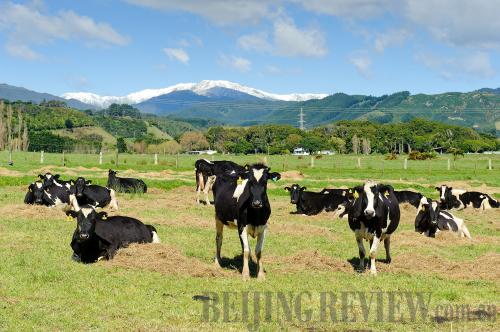|
 |
|
FERTILITY: Dairy cows rest in the sun at Lutz Farm in Otaki, New Zealand. The Lutz farm supplies milk to Fonterra, which has trading links with China (BLOOMBERG) |
The news China Investment Corp. wanted to invest NZ$6 billion ($4.8 billion) in New Zealand sent the country's stock market spiraling into its best day in three years in late May. This followed an ongoing internal wrangle in New Zealand over whether Shanghai Pengxin Group should be allowed to buy into the defunct Crafar faming empire.
The country itself is sharply divided over the issue of Chinese investment. The heart of the matter is a percentage of New Zealanders fear not only the overseas control of what they perceive as their assets but also that it represents an attempt to widen China's political influence in the region.
China does need the resources and it's honest about that, but, strange as it might seem to New Zealanders, the political considerations probably don't matter, as Australia is coming to realize, especially with the ever-vigilant anti-China lobbies present there and in New Zealand.
The most extreme and silliest of the anti-China attitudinizing is represented by New Zealand First leader Winston Peters. In a speech, he opined, "When the Chinese and the Australians own your power stations you better start buying some more clothes and blankets because the price will go through the roof."
Here's a thought for Winston: If a team of Chinese workers had been put on constructing Transmission Gully then the project would have been completed in three months, on time and under budget, without endless wrangling involving gigantic costs blowouts. If the Chinese ever get around to owning New Zealand's power grid, which is highly unlikely, it's probable the system will operate more efficiently and at considerably less cost to the consumer.
Compare China's preparations for the 2008 Olympic Games in Beijing—the construction in three years of several subways throughout the capital city and the world's biggest airport; all opened on time and working—with England's inability to make the third stage at Heathrow work, or even to open and close the roof over the new Wembley stadium.
This somewhat unthinking attitude underpins much of the vitriol directed against China in various areas of New Zealand.
John Hartevelt, a famous commentator in New Zealand, touched upon these attitudes on the Stuff.co.nz website earlier this month: "If we were worried about foreigners … buying up farmland, shouldn't we have been clamoring over the 36 separate sales of agricultural land to British investors in the past five years? … The unavoidable conclusion is that somehow, politically, Chinese investment is scarier than that from any other country."
Hartevelt goes on to note, while there should be caution, there should also certainly be discussion.
One of the clear-headed New Zealand commentators, Fran O'Sullivan, in the New Zealand Herald, said, "Even if a top-notch fund does finally invest a significant amount in NZ dollar and equity assets, this should not provoke the kind of mad allegations that the current government is a bunch of quislings bent on selling New Zealand." O'Sullivan goes on to say interest in New Zealand by Asian investors is a vote of confidence in the country as a safe place to invest.
Even right-wing New Zealand politicians—following in the track of former Prime Minister Helen Clark and Australian counterpart Kevin Rudd—are realizing how important the relationship with China will be in the future.
Former Prime Minister Jenny Shipley is adamant New Zealand can not allow xenophobia to cloud any appraisal of possibilities for development. "Today our generation has to look to China. And for my generation and my parents' generation, if we don't get over this, we should get used to wearing jandals (flip-flops)."
The most sensible attitude, in these days of globalization, it seems to me, is Joe Massey's. He was chief U.S. trade negotiator with China and Japan from 1985 to 1992.
Quoted in the New Zealand Herald, he said, "In a normal transaction it shouldn't matter who the investor is. If the location and the operation of the investment is in New Zealand, then ultimately New Zealand has control of it. And if they're bringing more money into the economy and paying a higher price, perhaps the entire economy is benefiting."
Massey notes, in the United States, "the fear is more in the newspapers, and not in the business community. For five-and-a-half centuries the West has had a huge breathing space because the biggest guys in the world basically turned inward. But they are back, and they know how to make money and they intend to do it, and the world will adapt to them."
Maybe part of the money can go to improve New Zealand's Internet provider services. At Auckland International Airport one booth charges NZ$10 ($8.15) an hour; in Beijing the average subscriber can have ADSL, consistently downloading at between 280/320kbs for a month, for NZ$30 ($24.5).
The author is a New Zealander living in Beijing | 